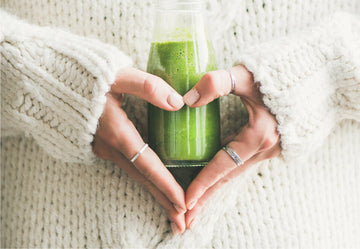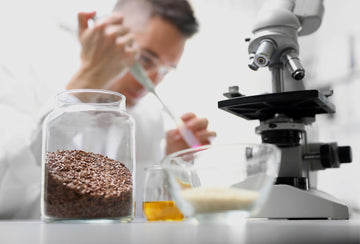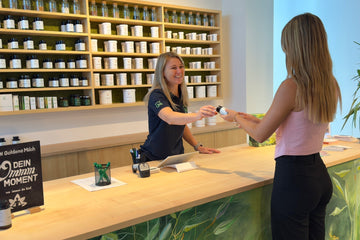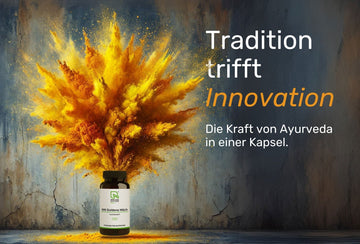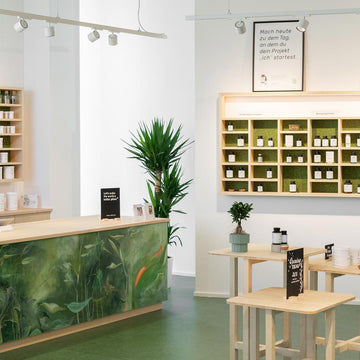You've probably experienced this: You stand in front of the mirror in the morning and suddenly discover a new wrinkle that wasn't there yesterday. Perhaps your skin has lost some of its radiance, or small pigment spots have appeared that you don't like at all. The aging process can't be stopped, but you can influence it – and not just with creams, serums, or the right makeup. A key factor also lies in your diet, specifically antioxidants.
Antioxidants can help support your skin from within. In this blog post, you'll learn what antioxidants are, how they work in your body, and how you can incorporate them into your daily diet to slow the aging process.
What are antioxidants actually?
Before we dive deeper, let's briefly clarify what antioxidants are. Imagine your body is a city. In this city, there's a lot of construction projects and repairs going on—these are your normal metabolic processes. However, these processes also produce "waste products" in the form of free radicals. Free radicals are tiny troublemakers that wreak havoc in your city by attacking and damaging cells, thus contributing to the visible signs of skin aging, such as wrinkles or dark spots.
This is where antioxidants come in. Antioxidants are the heroes who, in this scenario, put the city back in order. They scavenge free radicals and neutralize them before they can cause major damage. This means that antioxidants can help protect the skin from harmful influences—such as environmental factors, UV radiation, and other stressors that can produce free radicals in your body.
How do free radicals arise?
Unfortunately, free radicals are quite difficult to avoid. They are unstable molecules that form in your body when atoms or molecules have an unpaired electron. This makes them highly reactive and aggressive, as they constantly try to steal electrons from other molecules to restore their stability. However, this process can cause damage to your cells, as the free radicals attack cellular structures, ultimately leading to oxidative stress.
Free radicals are created both by normal metabolic processes like respiration and digestion, as well as by external factors like UV radiation, environmental pollution, smoking, and an unhealthy diet. When they are present in excessive quantities and your body can no longer neutralize them, they accelerate skin aging and contribute to various health problems. This is where antioxidants come in, which can neutralize free radicals and thus protect your cells.
Can you turn back the clock?
Of course, it would be great if we could simply press "pause" on the aging process. But while antioxidants can help slow the signs of aging, it's important to be realistic. They can't work magic—but they can be a valuable piece of the puzzle in your skincare routine.
So if you're interested in youthful skin, it's a good idea to keep free radicals at bay as much as possible, and the best way to do that is through your diet.
Antioxidants in your diet – your protection from within
Scientific studies 1 suggest that an antioxidant-rich diet can positively influence skin's appearance by protecting it from harmful environmental influences. However, it is not a substitute for other measures such as sunscreen or good moisturizing. A healthy lifestyle, sufficient sleep, and a good balance between stress and relaxation also play an important role.
There are numerous foods that are naturally rich in antioxidants. These include berries (which not only taste amazing, but are also great in your smoothie), nuts, dark chocolate, leafy green vegetables, and colorful fruits like oranges or kiwis. These foods provide your body with antioxidants that can help neutralize free radicals.
If you regularly spice up your diet with these "guardian angels," you may be able to naturally influence your aging process.
Vitamin C: The classic among antioxidants
Vitamin C is probably the best-known antioxidant, and for good reason. Not only does it contribute to the normal function of the immune system, but it also plays a key role in the skin. Officially, vitamin C contributes to normal collagen formation, which is important for the normal function of the skin 2 . This means that this vitamin can help your body maintain collagen. And as you may know, collagen is responsible for your skin's elasticity and firmness.
Additionally, vitamin C can help protect cells from oxidative stress. Oxidative stress is caused by the free radicals we've already discussed. Getting enough vitamin C may help make your skin less susceptible to wrinkles and other signs of aging.
You can find vitamin C in many foods, especially citrus fruits like oranges, grapefruits, and lemons. Peppers, broccoli, and berries are also excellent sources.
Vitamin E: The moisturizer
Vitamin E is another powerful antioxidant, best known for its role in protecting skin cells. Similar to vitamin C, vitamin E can help protect your skin from the effects of free radicals.
Vitamin E is also known to help the skin retain moisture, which helps keep the skin soft and supple. Dry skin is more prone to wrinkles, and this is where vitamin E may play a supporting role. You can find it in foods like nuts, seeds, vegetable oils, and avocados.
Polyphenols: Plant protection for your skin
Polyphenols are a group of antioxidants found primarily in plant-based foods such as fruits, vegetables, tea, and red wine. Yes, a glass of red wine in the evening can actually help protect your skin from the signs of aging.
Polyphenols have anti-inflammatory properties and can help protect the skin from harmful environmental influences. They are found in particularly high concentrations in green tea, berries, and dark chocolate. That's good news: if you have to choose between a piece of chocolate and a salad, you now know that chocolate is a legitimate option to do something good for your skin ;-).
Beta-carotene: The orange beauty maker
Beta-carotene is the pigment that gives carrots, sweet potatoes, and pumpkins their bright orange color. It is a powerful antioxidant and can be converted into vitamin A in the body. Officially, vitamin A contributes to the maintenance of normal skin 2 . This means that an adequate intake of beta-carotene can help support normal skin function.
Beta-carotene is often associated with a healthy, radiant complexion, as it protects the skin from within and can promote its regeneration. So if you're interested in a natural glow, incorporating more orange-colored foods into your diet might be a good idea.
How to incorporate antioxidants into your daily routine
Don't worry, you don't have to suddenly start drinking an antioxidant cocktail every day (although that certainly wouldn't hurt). There are many easy ways to make your diet antioxidant-rich:
-
Smoothies: A breakfast smoothie with berries, spinach, and a little orange juice provides you with a good dose of vitamin C, vitamin E, and polyphenols.
-
Snacks: Grab a handful of nuts or a piece of dark chocolate when you're feeling a little peckish. Both are rich in antioxidants and support your skin from within.
-
Salads: Add peppers, carrots, and avocado to your salad for a colorful mix of vitamin C, beta-carotene, and vitamin E.
Dietary supplements: A practical helper in everyday life
Sometimes it's difficult to get all the necessary nutrients through diet alone. This is where supplements can be a useful addition. They help you get the antioxidants your body may need to keep oxidative stress in check, even if your diet isn't as colorful and varied.
But be careful: dietary supplements are not miracle cures. They can be a useful addition to a balanced diet, but they should not be viewed as a substitute for a healthy lifestyle. As with everything in life, the right balance makes all the difference.
Product recommendation: NN Antioxidant Capsules – Your support against free radicals
The NN Antioxidant Capsules contain a combination of vitamin C and vitamin E – two of the most powerful antioxidants that help protect cells from oxidative stress. Additionally, this product offers antioxidants such as glutathione, OPC from grape seeds, and beta-carotene, which can further enhance the cell-protective effect. What's particularly exciting is that OPC not only supports cells itself, but also enhances the effects of vitamins such as vitamin C. A truly all-round feel-good package for your skin.
Conclusion: Your beauty comes from within
There's no denying it: the aging process is a natural part of life. But with the right internal care—through a balanced diet and the support of antioxidants—you can help your body stay radiant and vital for longer. Whether through fresh fruit, crunchy vegetables, or convenient supplements, antioxidants can play an important role in your daily routine. And if you're having fun while you do it, perhaps enjoying the occasional piece of chocolate, all the better!
You deserve to feel good from the inside out and show it on the outside. And don't forget: A smile is also a great anti-aging trick! ;-)
Sources:
1 Michalak, M. (2022): Plant-Derived Antioxidants: Significance in Skin Health and the Aging Process. Department of Dermatology, Cosmetology and Aesthetic Surgery, Collegium Medicum, Jan Kochanowski University, Poland. Int. J. Mol. Sci. 2022, 23(2), 585
2 European Commission (2024): Health Claims. Food and Feed Information Portal Database. https://ec.europa.eu/food/food-feed-portal/screen/health-claims/eu-register


